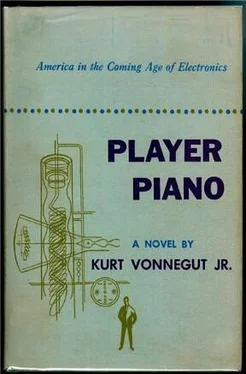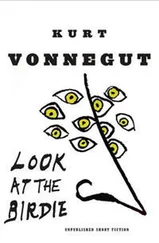As Paul's teammates carried him back to his seat, he realized fleetingly, as a fragment of a nightmare, that the cook had been Alfy, the master of silent television.
"Now, now," said the loudspeaker. "No more rough stuff, or we'll have to call off the rest of the fun. Now, where's the captain of the White Team?"
When the fun was over, Paul and Doctor Harrison of Ithaca walked out together.
"You have ten minutes of free time until the memorial service," said the loudspeaker. "Ten minutes to make new contacts before the memorial service."
"Nice meeting you, sir," said Doctor Harrison.
"I enj -"
"My wild Irish rose," howled the loudspeaker, "the sweetest flow'r that grows -" The refrain ended in a clatter. "Your attention, please. The Program Committee has just informed me that we're running seven minutes behind schedule, so would you please form up at the Oak right away, please. The memorial service will take place right away."
A reverent hush settled like smog over the perspiring crowd that had dispersed over the shuffleboard courts and around the ping-pong tables near the dining hall. Now they began to form about the Oak, the official symbol for the entire national organization. Its image was on every letterhead, and, stitched in a rectangle of white silk, its image snapped in the breeze, just below the American Flag on the parade-ground mast.
The youngsters imitated the oldsters' uniform stances of piety: eyes fixed on the lower branches of the magnificent old tree, hands folded before their genitals.
"White's going to win!" cried a short, thin youngster with big teeth.
The older men looked at him with sadness, with melancholy rebuke. Now was not the time for such horseplay. Now was almost the only time that was not the time. The youngster's outburst of infinite bad taste would poison his next two weeks, and probably his career. He had in an instant become "the boy who yelled at memorial service." That described him, and nobody would care to investigate him any further. Now, if he turned out to be a spectacular athlete . . . No. His flaccid physique and pale skin indicated that this avenue to forgiveness was closed to him.
Paul looked at him sympathetically, and recalled similar bad starts from the past. The man would be terribly lonely, turn to a career of surly drinking, and never be invited again.
The only sounds now were the rustling of leaves and the fluttering of the flags, and now and then the clatter of dishes and silverware from the dining hall.
A harried-looking photographer ran in front of the group, dropped to one knee, fired a flashbulb, and ran away again.
"Vuuuuzzzzzip!" went a rocket. "Kabloooom!" A parachuted American Flag was flung from the bomb to drift lazily to the river.
Kroner detached himself from the crowd and walked soberly to the thick tree trunk. He turned and looked down at his hands thoughtfully. His first words were so soft, so choked with emotion, that few heard them. He inhaled deeply, threw back his shoulders, raised his eyes, and gathered strength to say them again.
In the brief moment before Kroner spoke again, Paul looked about himself. His eyes met those of Shepherd and Berringer, and what passed between them was tender and sweet. The crowd had miraculously become a sort of homogenized pudding. It was impossible to tell where one ego left off and the next began.
"It is our custom," said Kroner; "it is the custom here at the Meadows - our custom, our Meadows - to meet here under our tree, our symbol of strong roots, trunk, and branches, our symbol of courage, integrity, perseverance, beauty. It is our custom to meet here to remember our departed friends and co-workers."
And now he forgot the crowd, and talked to the fat cumulus clouds scudding over the blue sky. "Since last we met, Doctor Ernest S. Bassett has left our world for his reward in a better one. Ernie, as you all know, was -"
The photographer ran out, flashed a bulb in Kroner's face, and disappeared again.
"Ernie was manager of the Philadelphia Works for five years, of the Pittsburgh Works for seven. He was my friend; he was our friend: a great American, a great engineer, a great manager, a great pioneer at the head of the procession of civilization, opening new, undreamed-of doors to better things, for better living, for more people, at less cost."
Now and then brokenly, Kroner told of Ernie Bassett as a young engineer, and he traced his career from works to works.
"He gave himself unstintingly engineeringwise, managershipwise, personalitywise, Americanwise, and -" Kroner paused to look impressively from face to face. Again he talked to the clouds - "heartwise."
A man stepped from the crowd to hand Kroner a long white box. Kroner opened it slowly and studied it thoughtfully before showing its contents to anyone else. At last he reached in and unfurled a blue and white pennant, the Armed Forces "E" that Bassett had won during the war as manager of the Philadelphia Works.
A muted bugle played taps.
Kroner knelt at the foot of the tree and placed Ernie Bassett's pennant there.
The photographer dashed up, got the picture, and dashed away.
"Vuuuuzzzzzip! Kablooom!"
A male choir, concealed in the shrubbery, sang ever so softly - to the tune of "Love's Sweet Song":
"Fellows at the Meadows,
Lift your tankards high;
Toast our living symbol, reaching toward the sky.
Grown from but an acorn,
Giant now you are;
May you ne'er stop growing;
Rise to the stars!
Proud sy-him-bol a-hov
Ourrrrrrrrs."
"A minute of silence in unspoken prayer for departed friends," said the loudspeaker. All through the minute of silence, Paul was aware of a snuffling in the background. Someone's dam of reserve had broken under the impact of the ceremony - someone who must have been awfully close to Bassett. There were tears standing in many eyes, and here and there teeth were sunk in unstable lips, but nowhere could Paul see the sobber. Suddenly he spotted him, not in the crowd, but in the dining hall. Luke Lubbock, a pile of dirty dishes in his arms, had been completely carried away. Big, honest tears for the manager of the Pittsburgh Works flooded his cheeks. Rather roughly, the headwaiter hustled him away from the screen door.
"Vuuuuzzzzzip! Kablooooom!"
The band exploded into "The Stars and Stripes Forever," and Kroner was half led from the tree by other oldsters who had known Bassett well. The crowd dispersed.
Paul looked longingly at the doors of the saloon, which was located in a separate white building. He tested the doors to make sure they were really locked, and of course they were. The saloon never opened until the cocktail hour, after the games.
"Your attention!" said the loudspeaker. "Your attention, please. The program for the rest of the day:
"In ten minutes the teams will meet at their captains' tents for assignments to various sports. Formal competition will not begin until tomorrow morning. After assignment, relax, get to know your buddy, don't hang around with the same old crowd.
"Cocktails at five-thirty. Supper at six-thirty. Now - attention to this change: the keynote play and bonfire will not take place tonight. Will not . They will take place tomorrow night, and there will be a group sing tonight in the amphitheater instead. Taps at midnight.
"Team captains, team captains - will you please report to your tents."
Without much hope, Paul rattled the saloon doors, thinking he might be able to talk a floor sweeper inside into getting him a little something.
"I've just been informed," said the loudspeaker, "I've just been informed that the captain of the Blue Team is not in his tent. Doctor Paul Proteus; Doctor Paul . . ."
Читать дальше








![Курт Воннегут - Вампитеры, фома и гранфаллоны [litres]](/books/397997/kurt-vonnegut-vampitery-foma-i-granfallony-litre-thumb.webp)